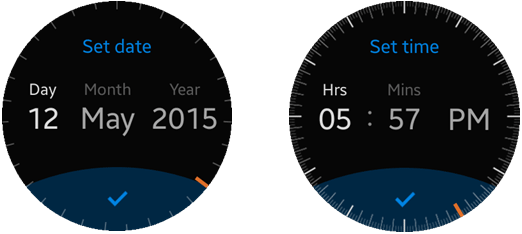Circle Datetime
This feature is supported in wearable applications only.
The circle datetime extends elm_datetime by visualizing the selected field. If a rotary event is activated by eext_rotary_object_event_activated_set(), a circle datetime increases or decreases value of selected field in elm_datetime by the clockwise or counter clockwise rotary event.
Figure: Circle Datetime

Creating a Circle Datetime
To create a circle datetime object, use the eext_circle_object_datetime_add() function.
When creating a circle datetime, the elm_datetime handle must be passed as a parameter. If a circle surface is passed as a parameter, a circle object connected with a circle surface is created, and it is rendered by the circle surface. When NULL is passed as a surface parameter, the new circle object is managed and rendered by itself.
Evas_Object *datetime; Evas_Object *circle_datetime; datetime = elm_datetime_add(parent); circle_datetime = eext_circle_object_datetime_add(datetime, surface);
Activating a Rotary Event
To activate and deactivate the circle datetime, use the eext_rotary_object_event_activated_set() function. If the second parameter is EINA_TRUE, the circle datetime can receive the rotary event. Otherwise, the circle datetime cannot receive the rotary event.
eext_rotary_object_event_activated_set(circle_datetime, EINA_TRUE);
Using the Circle Object Property
A circle datetime has the following styles:
- default
When created, the circle datetime automatically has the default style.
The circle datetime objects support the following circle object functions:
- eext_circle_object_line_width_set()
- eext_circle_object_line_width_get()
- eext_circle_object_radius_set()
- eext_circle_object_radius_get()
- eext_circle_object_color_set()
- eext_circle_object_color_get()
- eext_circle_object_disabled_set()
- eext_circle_object_disabled_get()
A circle datetime has the following item:
- default: Default circle item that draws a marker.
You can change the item properties by using the eext_circle_object_item_XXX() functions.
For more information, see the Efl Extension Circle Datetime API.

